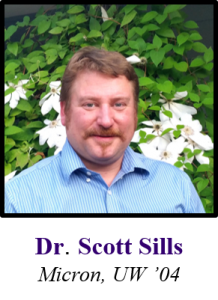April 8, 2019
2018 Graduate Student Symposium
Eleventh Annual Chemical Engineering Graduate Student Symposium
Thursday, September 20, 2018
Location: NanoES Building – UW Seattle [Directions]
Time: 1:00 p.m. onwards [Full Schedule]
About the Event
ACES is committed to providing its students with opportunities for professional development and outreach beyond those typically available during graduate study. Of these, the Graduate Student Symposium (GSS) has been conceptualized with the goal to bridge the gap between industry and academia. For industry representatives this event provides an overview of the exciting research at UW ChemE, and an opportunity to interact with future research leaders and help improve the quality of graduate education. Now in its eleventh year, our GSS has evolved to become a lively forum for enlightening discussions and knowledge exchange among our students, industry and leaders from the community at large.
RSVP Now!
Confirm your participation at this link.
For any questions, please contact Andrea Joseph or Mike McKenna, our GSS 2018 co-chairs
Keynote Speaker
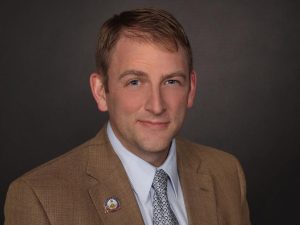
Dr. Christopher Rothfuss is the Senate Minority Leader of the Wyoming State Legislature. He was first elected to the Wyoming State Senate in 2010, representing District 9 in Laramie, Wyoming, and was selected Minority Leader in 2013. He serves on numerous Senate committees and task forces, notably the Senate Education Committee, the Minerals, Business and Economic Development Committee, the Senate Rules Committee, and the Management Council. From 2014-2016, Senator Rothfuss was chairman of the Digital Information Privacy Task Force, and now serves on the Blockchain Task Force. Senator Rothfuss is also an advanced technology consultant and a visiting Professor for the Honors College at the University of Wyoming.
Prior to returning to Laramie in 2006, Chris served as a AAAS Science & Technology Policy Fellow at the U.S. Department of State, chiefly as senior nanotechnology advisor, and as the U.S. delegate to the UN Committee on the Peaceful Uses of Outer Space (COPUOS). He first worked in the Office of the Science and Technology Adviser to the Secretary, and then in the Office of Space and Advanced Technology. In addition to his primary role, he provided advice and analysis for the development of U.S. foreign policy on myriad issues such as remote sensing, missile technology, and advanced energy technologies during his stint at the Office of Space and Advanced Technology.
Chris holds a BA in international studies and an MS in chemical engineering from the University of Wyoming; and an MS in applied physics and a PhD from UW ChemE, graduating from Prof. Eric Stuve’s group in 2003.
Cross-Disciplinary Panels
The Eleventh Graduate Student Symposium will also feature panel discussions and interactions with industry professionals from a diversity of careers. These are intended to give students a sense of the entire gamut of potential post-graduation career paths, as well as help graduate students gain an outside perspective on their specialized research.
2018 Panelists:
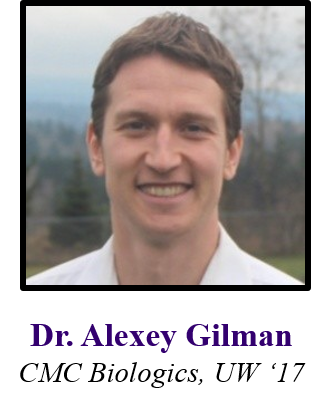
Alexey Gilman received his BS in Chemistry with Chemical Engineering option from Oregon State University in 2010. He then worked as a diffusion process engineer in semiconductor manufacturing outside of Portland, Oregon before enrolling in the graduate program at UW ChemE. As a graduate student at UW, Alexey was co-advised by Professors Mary Lidstrom and David Beck. His research focused on the development of a process for converting natural gas into liquid fuels via methane oxidizing bacteria. Alexey graduated UW in 2017, and now works as a process development scientist for AGC Biologics in the Seattle area.
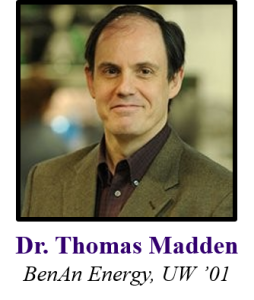
Thomas Madden currently serves as the Chief Technical Officer of BenAn Energy, a Shanghai-based battery developer of aqueous sodium ion batteries that was spun-out of the Shanghai Institute of Ceramics in 2015. BenAn also maintains a small R&D team working out of the Washington Clean Energy Testbeds facility. Tom previously worked at Aquion Energy, hired initially as VP of Research and Development in 2015 until promoted to Chief Technical Officer in 2017. Tom managed company technical operations through its Ch. 11 restructuring period through to acquisition. Before that, Tom was Sr. Manager of Stack Development at Lockheed Martin Advanced Energy Storage (LMAES) in Cambridge MA. LMAES was formed following the acquisition of MIT-spinout Sun Catalytix, where Tom directed the development of electrochemical stacks for both hydrogen generation and energy storage applications. Prior to Sun Catalytix, Tom managed stack technology development at UTC Power for all transportation fuel cell programs, including buses, submarines, and automotive auxiliary power units, achieving various corporate recognition awards for various accomplishments. He has also served in senior technical roles at United Technologies Research Center and Primus Power. Tom serves DOE as a Proposal Reviewer for DOE EERE and ARPA-E funding solicitations, and as Merit Reviewer for DOE EERE programs. He has also served as a reviewer for Journal of the Electrochemical Society and as an adjunct professor of Materials Science at Carnegie Mellon University. He is an author on 13 peer-reviewed publications and 25 patents or patent applications. Tom received his B.S. from the University of Cincinnati, and his Ph.D from the University of Washington, both in Chemical Engineering.
Scott Sills is a Senior Member of the Technical Staff in the Emerging Memory Group at Micron Technology, Inc. He began working on emerging memories in 2002 with IBM’s Millipede Storage Project, then joined Micron in 2006. He has led several efforts that brought new devices and new processing techniques from the lab-to-fab, including resistive random access memory devices, along with bottom-up processes involving directed molecular self-assembly. Scott’s R&D focus encompasses nanoscale devices and mesoscopic material systems, processing and assembling materials at the nanoscale, and elucidating the roles of finite-size effects as they pertain to material scaling and the performance of integrated devices.
Scott received his Ph.D. in Chemical Engineering from the University of Washington in 2004, and his Bachelors in Chemical Engineering from the University of Delaware in 1995. He has authored three book chapters, over twenty journal articles, and over one hundred U.S. patents. He is a member of the technical committee for the IEEE Nonvolatile Memory Technology Symposium and adjunct faculty for the Materials Science and Engineering Department at Boise State University.
Student Presentations
Each year, a select number of graduate students in the department present their research at the symposium. This year will also feature interesting talks spanning all the research areas at UW ChemE.
2018 Presenters:
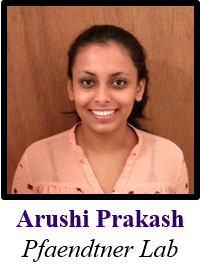
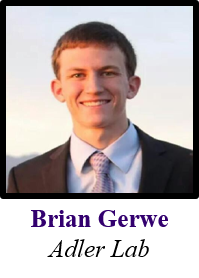
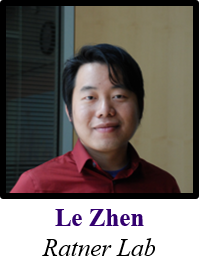
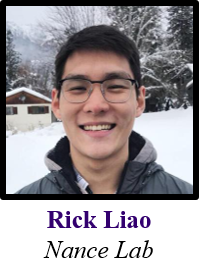
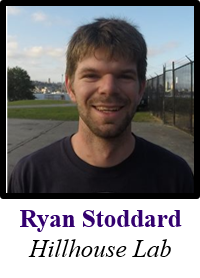
We Are Grateful to our Sponsors:




